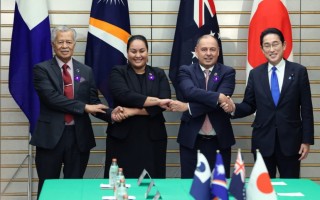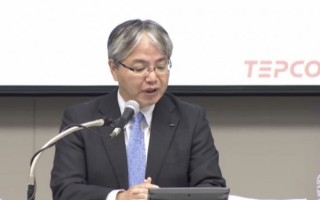Loading
Search
▼ Countdown Starts To Japan's First Release Of Treated Nuclear Wastewater
- Category:Other
A Japanese government spokesperson says it is "not wilfully trying to divide the Pacific" over the Fukushima waste release.
Japan is set to start discharging more than one million tonnes of treated nuclear wastewater into the Pacific Ocean on Thursday local time.
This comes 12 years after a tsunami slammed the Fukushima Daiichi Nuclear Power Plant resulting in what has been labelled as the largest civil nuclear energy disaster since Chernobyl.
Palau, Papua New Guinea, Cook Islands and the Federated States of Micronesia have publicly backed the plan or at least placed their faith in Japan's word that it will be safe.
The release is forecast to take 30 to 40 years to complete.
IAEA Director General Rafael Grossi delivers report on Japan's ALPS-treated wastewater plans to the Pacific Islands Forum chair, Cook Islands Prime Minister Mark Brown in Rarotonga. Photo: Supplied/ IAEA
Fiji's Prime Minister Sitiveni Rabuka is the most recent Pacific leader to speak out in defence of Japan.
He said he is satisfied their plan is safe after reading the UN nuclear agency's report.
Rabuka's voice is important because he is in the Pacific Islands Forum leadership team - known as Troika - as the past chair of the Forum. The other two are current chair Cook Islands Prime Minister Mark Brown and future chair, the Tongan Prime Minister Hu'akavameiliku Siaosi Sovaleni.
Since making that statement Rabuka has apologised for speaking ahead of the recent Troika meeting, but he has not backtracked on his view.
'Discharged' into Japan's own backyard
Rabuka has taken to social media in response to criticism of his statement of support.
"Comparisons between the nuclear legacy in the Pacific and Japan's nuclear wastewater release is fear-mongering," he wrote.
He also said the wastewater is not being dumped but discharged into Japan's own backyard, over 7000km from Fiji.
That in itself has been the centre of debate with nuclear activists continuing to call it a dump.
One nuclear expert appointed by the Pacific Islands Forum said there is an argument that it is a dump over a release.
But the International Atomic Energy Agency has gone to great lengths - even travelling to New Zealand and Rarotonga - to explain why this is not a dump.
Director general Rafael Grossi told RNZ Pacific earlier this year he condemns dumping which he said had happened in the past and is not the case for Japan's plan.
Vanuatu's foreign minister has drafted a declaration urging Japan to stop the discharge.
He wants the leaders of the Melanesian Spearhead Group (MSG) meeting in Port Vila today to support it.
Tuvalu has also spoken out, expressing opposition to Rabuka's stance.
Tuvalu's Minister for Finance, Seve Paeniu told FBC News if Japan is genuinely confident, why does it not consider disposing of it within their own lakes and waters.
Tokyo Electric Power Company Holdings (TEPCO) spokesperson Junichi Matsumoto told the first media briefing on Wednesday his team is "moving quickly" to prepare the release which will dependent on the conditions.
"The final decision will be made on the morning of the 24th based on the climate conditions or weather conditions," he said.
"A very small amount will be carefully discharged using a two-step process."
RNZ asked TEPCO about the nuclear legacy in the Pacific.
"To the members of the PIF, we have been providing explanations on the discharge into the sea," Matsumoto said.
"So we would like to continue to provide the explanation on our initiative.
"And in terms of assurance, it may be a bit different in terms of nuance, but the result of sea area monitoring will be communicated.
Matsumoto said anyone wishing to can check the results of the sea area monitoring on the TEPCO website."
When questioned on when Pacific nations will see the effects of the release he said, according to dispersion models, particles will arrive on the shores of Papua New Guinea and Fiji in "a few years' time or a few decades".
"It will be impossible to distinguish that tritium [in the Pacific Ocean] from that already existing in nature," Matsumoto said.
A Japan government spokesperson said Tokyo is not wilfully trying to divide the Pacific and no compensation will be given to Pacific nations for potential reputational damage.
"The Japanese government has been taking opportunities at international conferences and at bilateral meetings to thoroughly and meticulously explain and disseminate information to the world through its website, as well as through social network media including X (formerly Twitter)," the spokesperson said.
Japan is set to start discharging more than one million tonnes of treated nuclear wastewater into the Pacific Ocean on Thursday local time.
This comes 12 years after a tsunami slammed the Fukushima Daiichi Nuclear Power Plant resulting in what has been labelled as the largest civil nuclear energy disaster since Chernobyl.
Palau, Papua New Guinea, Cook Islands and the Federated States of Micronesia have publicly backed the plan or at least placed their faith in Japan's word that it will be safe.
The release is forecast to take 30 to 40 years to complete.
IAEA Director General Rafael Grossi delivers report on Japan's ALPS-treated wastewater plans to the Pacific Islands Forum chair, Cook Islands Prime Minister Mark Brown in Rarotonga. Photo: Supplied/ IAEA
Fiji's Prime Minister Sitiveni Rabuka is the most recent Pacific leader to speak out in defence of Japan.
He said he is satisfied their plan is safe after reading the UN nuclear agency's report.
Rabuka's voice is important because he is in the Pacific Islands Forum leadership team - known as Troika - as the past chair of the Forum. The other two are current chair Cook Islands Prime Minister Mark Brown and future chair, the Tongan Prime Minister Hu'akavameiliku Siaosi Sovaleni.
Since making that statement Rabuka has apologised for speaking ahead of the recent Troika meeting, but he has not backtracked on his view.
'Discharged' into Japan's own backyard
Rabuka has taken to social media in response to criticism of his statement of support.
"Comparisons between the nuclear legacy in the Pacific and Japan's nuclear wastewater release is fear-mongering," he wrote.
He also said the wastewater is not being dumped but discharged into Japan's own backyard, over 7000km from Fiji.
That in itself has been the centre of debate with nuclear activists continuing to call it a dump.
One nuclear expert appointed by the Pacific Islands Forum said there is an argument that it is a dump over a release.
But the International Atomic Energy Agency has gone to great lengths - even travelling to New Zealand and Rarotonga - to explain why this is not a dump.
Director general Rafael Grossi told RNZ Pacific earlier this year he condemns dumping which he said had happened in the past and is not the case for Japan's plan.
Against and on the fence
Vanuatu's foreign minister has drafted a declaration urging Japan to stop the discharge.
He wants the leaders of the Melanesian Spearhead Group (MSG) meeting in Port Vila today to support it.
Tuvalu has also spoken out, expressing opposition to Rabuka's stance.
Tuvalu's Minister for Finance, Seve Paeniu told FBC News if Japan is genuinely confident, why does it not consider disposing of it within their own lakes and waters.
TEPCO assures the Pacific
Tokyo Electric Power Company Holdings (TEPCO) spokesperson Junichi Matsumoto told the first media briefing on Wednesday his team is "moving quickly" to prepare the release which will dependent on the conditions.
"The final decision will be made on the morning of the 24th based on the climate conditions or weather conditions," he said.
"A very small amount will be carefully discharged using a two-step process."
RNZ asked TEPCO about the nuclear legacy in the Pacific.
"To the members of the PIF, we have been providing explanations on the discharge into the sea," Matsumoto said.
"So we would like to continue to provide the explanation on our initiative.
"And in terms of assurance, it may be a bit different in terms of nuance, but the result of sea area monitoring will be communicated.
Matsumoto said anyone wishing to can check the results of the sea area monitoring on the TEPCO website."
When questioned on when Pacific nations will see the effects of the release he said, according to dispersion models, particles will arrive on the shores of Papua New Guinea and Fiji in "a few years' time or a few decades".
"It will be impossible to distinguish that tritium [in the Pacific Ocean] from that already existing in nature," Matsumoto said.
A Japan government spokesperson said Tokyo is not wilfully trying to divide the Pacific and no compensation will be given to Pacific nations for potential reputational damage.
"The Japanese government has been taking opportunities at international conferences and at bilateral meetings to thoroughly and meticulously explain and disseminate information to the world through its website, as well as through social network media including X (formerly Twitter)," the spokesperson said.
- August 23, 2023
- Comment (0)
- Trackback(0)



